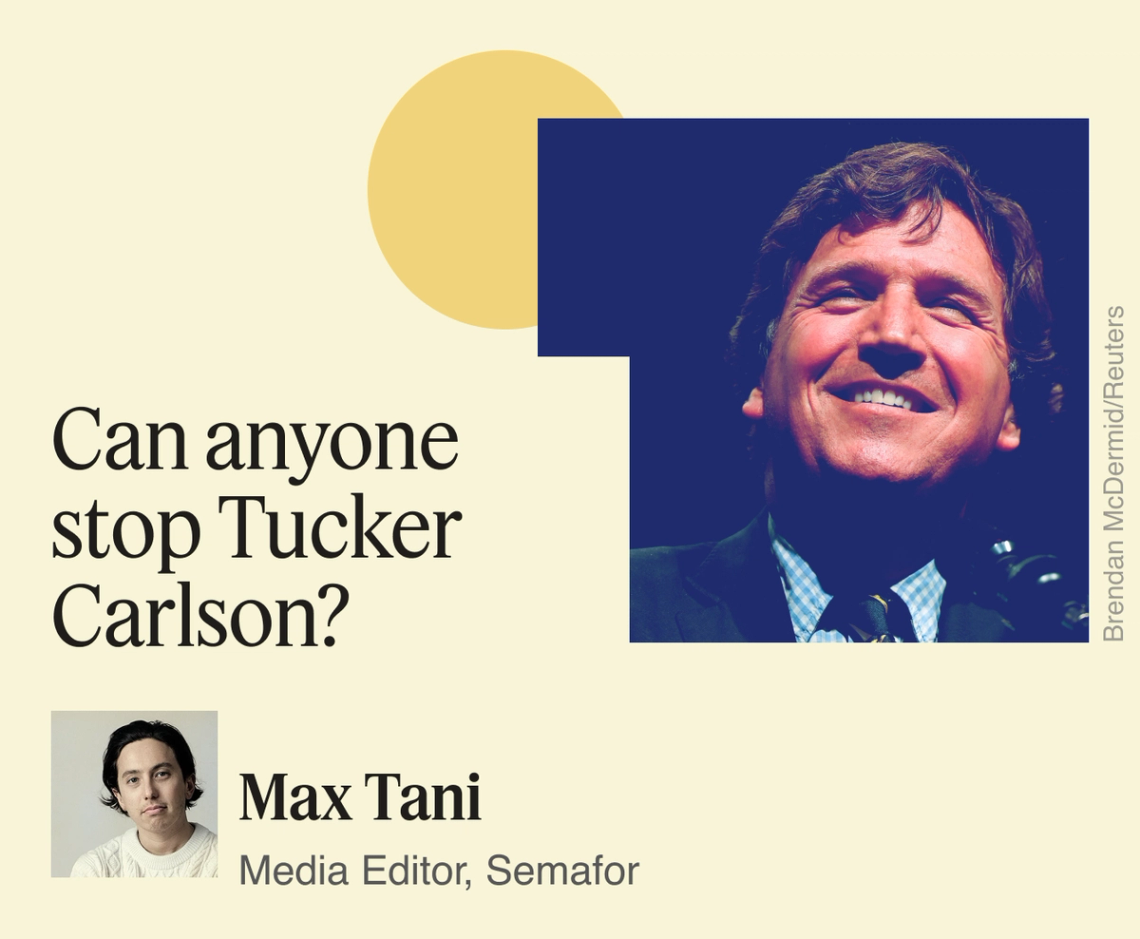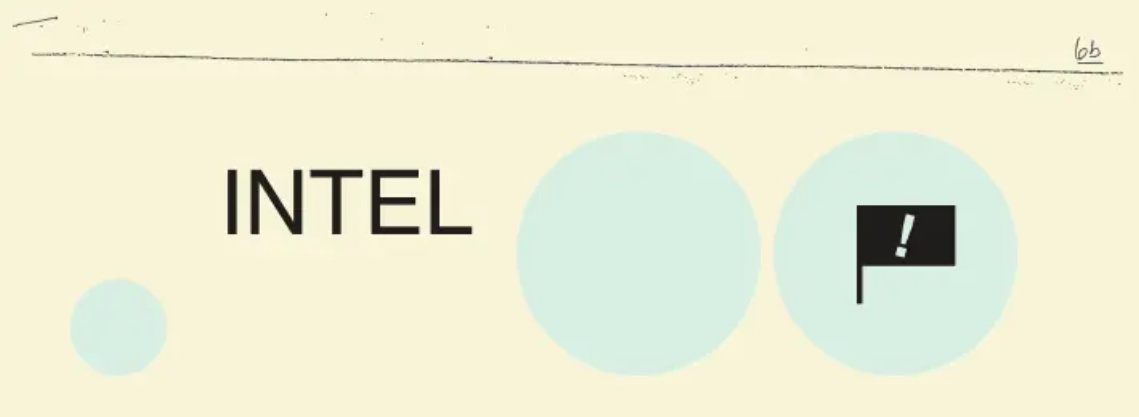| | In today’s edition: Tucker Carlson’s new critics, and a mothballed PBS documentary gets a showing. ͏ ͏ ͏ ͏ ͏ ͏ |
| |   New York New York |   Washington Washington |   Hollywood Hollywood |
 | Media |  |
| |
|
 - Vanity Fair’s balancing act
- Vintage Iraq War doc
- Training data
- DoppelBlasio
- Beef bots
- Mixed Signals
|
|
 I wrote last week about the emerging fissures in a right-wing media that now propels the White House’s decisions. Those fissures burst into the open last week, when Tucker Carlson conducted a friendly interview with the cheerfully white nationalist streamer Nick Fuentes. While Carlson disagreed at points with the 27-year-old commentator, he mostly listened patiently as Fuentes shared his life story and complained about “organized Jewry in America.” Carlson’s power and independence typically mute criticism from a right that Donald Trump has largely kept united during his time in office. But the sit-down with Fuentes went too far for a few. National Review, The Wall Street Journal’s editorial board, Texas Sen. Ted Cruz, and the conservative academic Robert George all sought to draw a line — joining Ben Shapiro, an increasingly loud anti-Carlson voice on the right. (Carlson told me Shapiro’s complaints have “amused” him.) And why should Carlson care? The uproar only seemed to boost his profile, and even prove out the dark hints he regularly makes that he alone speaks forbidden truths. His show returned to No. 2 on Spotify’s podcast charts, behind only Joe Rogan. In just five days, his interview with Fuentes became the fourth most-watched video on his YouTube channel. Also today: a mothballed PBS documentary gets a showing, beef bot swarms, and how YouTubers are monetizing their worst footage. |
|
A new Vanity Fair teeters between access and glamour |
 Danny Moloshok/Reuters Danny Moloshok/ReutersNew Vanity Fair editor Mark Guiducci has sought to remake the magazine by doubling down on splashy journalism and turning away from low-value churn. Five months in, Vanity Fair continues to publish original reporting by big-name journalists, but has begun to take on a more deferential relationship to celebrities — including royals. In September, Vanity Fair wrote a story detailing new revelations around Prince Andrew’s ex-wife Sarah Ferguson’s correspondence with disgraced financier Jeffrey Epstein. The draft of the story also mentioned Andrew’s adult daughters, known as Princess Beatrice and Princess Eugenie — who happen to be friends with Guiducci. The final version of the story mentioned the princesses only in passing, after Guiducci inquired about it. The publication’s editors have also asked journalists on staff to regularly consult parent company Condé Nast’s talent department before reaching out to stars for comment on some stories. All of this underscores the balancing act Guiducci and his magazine have to manage, Max writes, if they want to stay relevant and avoid the fate of some of their competitors. |
|
Iraq war documentary finally makes it to PBS |
 Screenshot/Manifold Productions/YouTube Screenshot/Manifold Productions/YouTubeThe conservative documentarian Michael Pack made The Last 600 Meters, an Iraq War film for PBS, in 2008. The public broadcaster rejected it as “too pro-military,” said Pack, who did a combative tour in Trump’s first term running the US Agency for Global Media, at a Washington, DC, screening Thursday. PBS reversed that decision this year (Chief Programming Executive Sylvia Bugg attended the screening and received polite applause) and the film — a gripping and linear narrative of Marines fighting their way through Fallujah — will air Nov. 10. One of the Marines interviewed is the future Democratic Massachusetts Rep. Seth Moulton, who muses on the irony of a high-tech military forced to depend on its soldiers “being able to fight a guy to the ground with a knife.” The film stays at the level of individual Marine officers and house-to-house combat, which has allowed it to age without feeling dated. It never engages with the larger political issues of the war, aside from occasional comments from Marine officers frustrated or mystified by Bush administration decisions to pull back from winning fights with insurgents. But former Trump adviser Steve Bannon, who produced the film, said afterward that he wanted to screen it at the White House, “so maybe we won’t go into Venezuela.” — Ben Smith |
|
Creators cash in on old content |
 Peter Hollens/YouTube Peter Hollens/YouTubeAI companies, eager for human-made content to feed their models, are turning some longtime creators’ archival footage into an unexpected windfall, Semafor’s Rachyl Jones reported this week. One startup, Troveo, has started directly paying social media influencers and creators for their content, while platforms like YouTube now allow creators to indicate with a checkbox that they’d be OK with AI models training on their videos. It’s a trend that belies the hostilities between AI giants and creatives, who’ve chafed at (and sometimes sued over) how companies use their work. The payouts can be significant: Acapella singer Peter Hollens said letting AI companies ingest his decade-old YouTube channel has been netting him $33 per hour of licensed footage, more than what he makes from YouTube itself via ad revenue — and the bots aren’t picky. “Your worst takes are worth just the same as the best thing you’ve ever shot,” Hollens told Rachyl. “Go take your money, girl.” |
|
 The two Bills meeting at a Mets game. Bill DeBlasio The two Bills meeting at a Mets game. Bill DeBlasioThe strangest story of New York City’s mayoral election — that former mayor Bill de Blasio had suddenly sandbagged his preferred candidate, frontrunner Zohran Mamdani, to a London newspaper days before the start of early voting — turned out to have a simple explanation: There is another Bill DeBlasio. He spells his name the “proper way” (with no space and a capital D), lives on Long Island, and sells wine. DeBlasio spoke to Semafor from a Florida restaurant via his Ring camera Wednesday evening, and he didn’t mind taking a few minutes away from dinner to clear up what he saw as an injustice: Contrary to the Times of London’s claim their reporter was “misled by an individual” falsely posing as the ex-mayor — and to The New York Times’ assessment that there had been an “impersonator” — DeBlasio had simply offered his opinions as a man named Bill DeBlasio, because he’d been addressed as such, and because he’s “always been Bill DeBlasio.” The ex-mayor de Blasio, very much still a Mamdani supporter, saw the Times of London quote from DeBlasio, cried foul, and demanded the article be retracted. And so a story that captivated New York media for days was resolved the old-fashioned way — with a knock on the door. — Brendan Ruberry |
|
Beef exec says bots are answer to influencing Trump |
 Jim Vondruska/Reutrers Jim Vondruska/ReutrersOne Washington veteran’s advice for navigating the Trump administration? Invest in an army of bots. “If you can find a way upfront to get ahold of the social media aspect of your industry, I would strongly recommend you do that early,” Ethan Lane, senior vice president of government affairs at the National Cattlemen’s Beef Association, told Semafor’s Eleanor Mueller during a recent Semafor event in Washington, DC. “This is an administration that places an incredibly high value on social media, on influencers; they don’t seem to have a huge amount of concern about whether those are real or sort of a creation of the internet.” Lane — whose industry faces a threat from abroad, in the form of Trump’s proposed efforts to support the Argentinian beef industry, drawing anger from farm-state lawmakers in his own party — went on to argue that organizations “don’t need $2 million in TV spend anymore to manipulate a conversation.” Rather, Lane said, they just need the “right few influencers and the right bots.” He added: “When you’re getting outspent and outgunned by computers, it’s a very frustrating situation.” |
|
Ken Burns on ‘Mixed Signals’ |
 Ken Burns has been telling the story of America through his entire career with genre-defining documentaries on the Civil War, the Vietnam War, and now the American Revolution. This week, Ben and Max bring on the renowned documentarian to talk about his latest series, the parallels he sees between America’s founding moment and today’s media environment, and what we can learn from our history. They also discuss what he makes of the Trump administration’s cuts to PBS, and — after spending 10 meticulous years making a 12-hour documentary — his take on short-form video and talk podcasts like this one. |
|
 - As we first reported, Trump sat down with CBS News for the first time since the network’s parent company paid him $16 million to drop his lawsuit against the network. Interestingly, the interview was conducted by Norah O’Donnell, who stepped down as anchor of CBS Evening News earlier this year but has become an increasingly important player in Bari Weiss’ new CBS. Speaking of Weiss: She continues to approach Fox News personalities for potential roles within the network, though it seems unlikely that the big names will jump ship.
- As more political figures move onto Substack, the platform is facing an interesting challenge: political spam blasts. Left-leaning YouTuber Keith Edwards pointed out last week that Democratic Rep. Haley Stevens had seemingly subscribed him to her email list without his permission, violating Substack’s rules. When I asked about the potential violation, the platform declined to comment. But a source familiar with the situation told me that Substack’s standards team reviewed the Michigan senate candidate’s email list, was reaching out to subscribers to confirm that they had intentionally opted in, and could take action if the platform discovers that Stevens signed people up without their permission.
|
|
| |  | | | You’re receiving this email because you signed up for briefings from Semafor. |
|